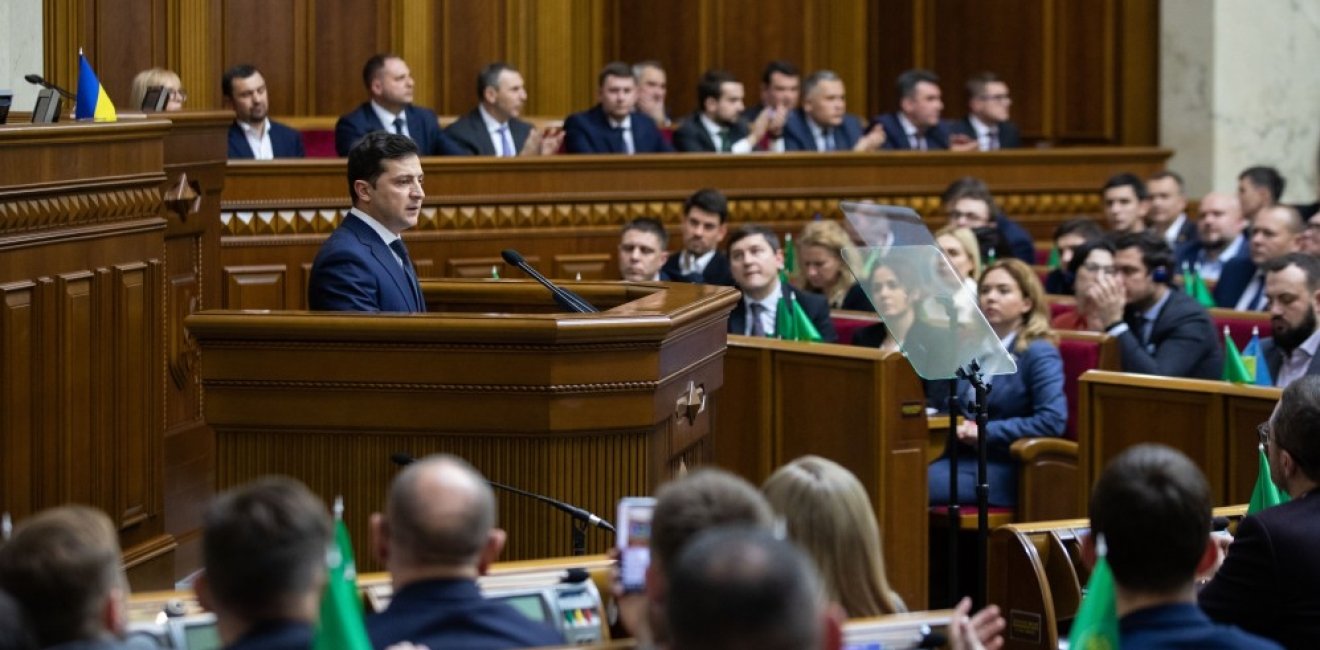
A blog of the Kennan Institute
BY MYKHAILO MINAKOV
“No story is ever over.”*
On March 4, 2020, Ukraine’s parliament approved a change of cabinet. Appointed on August 29, 2019, President Volodymyr Zelenskyy’s first cabinet barely survived six months, a short tenure marked by chaos. Thus the new political generation’s first attempts to create a better Ukraine have failed, putting in doubt the newcomers’ ability to effectively govern a large and culturally diverse European country.
In recent months, Ukrainian internal politics was marked by a series of mini-crises, mainly connected to the cabinet members and the Rada’s ruling faction, Zelenskyy’s Servant of the People party. A radical parliamentary opposition amplified the miscalculations of Zelenskyy’s team, making sure each failure became a media scandal and each scandal became a sort of mini-referendum on trust in President Zelenskyy.
So far, the opposition’s spoiler strategy has not proved effective. Volodymyr Zelenskyy remains the only politician whose trust rating is higher than distrust rating: in different polls, this ratio varies from 59 percent trust in the president to 32 percent distrust, to 51.5 percent versus 41 percent. However, the same polls show that distrust in the cabinet and the Rada has soared to over 64 percent for both institutions, and it can be safely assumed that the president is losing support as well.
“Farewell, Youth!”
On March 4, before Prime Minister Oleksiy Honcharuk, who was among those dismissed, spoke some parting words to the Rada, President Zelenskyy delivered a speech in which he blamed his own cabinet for unsatisfactory reforms. Specifically, reforms in the health care and social welfare spheres and the inexpensive provision of basic utilities were assessed as not responding to the core needs of Ukrainians. He also confessed that he did not control the siloviki (“securocrats,” officials and politicians associated with the security or military services who are now presiding as heads of the law enforcement agencies) sufficiently to be able to effectively punish corrupt officials. In a way, the president confessed to a mistake in putting together this particular cabinet.
In response, Prime Minister Honcharuk made a short, impassioned statement to the Rada in which he declared that his reforms had been quite successful but were clearly underappreciated. He also thanked the president for the opportunity to try to change Ukraine for the better.
At the conclusion of these exercises in blaming and thanking, the Rada issued its verdict: the prime minister was sacked by 353 votes (226 were needed). The youngest Ukrainian prime minister in the history of independent Ukraine and the cabinet have been abruptly dismissed.
“Greetings, youthful and unfamiliar clan!”
In line with information leaked before the vote in the Rada, President Zelenskyy proposed to the Rada appointing Denys Shmygal as the new prime minister.
Shmygal was named deputy prime minister in February. Educated in Belgian, Canadian, and Finnish universities, he had previously worked as head of the administration of Ivano-Frankivsk oblast (in 2019–20), as an executive at Rinat Akhmetov’s DTEK energy company (2017–19), and as an official and businessman (before 2017). Though coming with a strong economic and administrative background, Shmygal is a novice in politics, just as his predecessor was on the day of his appointment.
Shmygal offered the Rada his plan, which includes:
- economic reforms that promote the social welfare of citizens and deliver revenues to the state budget;
- reform of the public health system; and
- continued decentralization and ensuring the reintegration of non-controlled communities in the Donbas and Crimea.
After a short deliberation, parliament approved Shmygal as Ukraine’s prime minister with 291 votes. President Zelenskyy showed that he still controls parliament and can get the MPs’ approval of relatively unknown candidates at will for any post in the government.
Several positions in the new cabinet were also approved. The share of the cabinet that constitutionally belongs to the Verkhovna Rada, with appointments proposed by the prime minister, delivered 277 yea votes (out of 381) to affirm the choices of Shmygal. Shmygal proposed thirteen ministers and vice prime ministers, five of whom were members of the retiring Honcharuk cabinet. The ever-constant Arsen Avakov remains as minister of interior affairs, a position he has held since 2014 under multiple presidents. So far the new cabinet is overall more experienced, but four important ministerial positions remained unfilled: those of culture, education, energy, and economy (some of these ministries may actually be divided into two, so the open posts might amount to six, not four).
The president also received the Rada’s approval for his share of cabinet appointments. Dmytro Kuleba became minister of foreign affairs, and retired general Andrii Taran was approved as the new minister of defense.
According to sources in parliament, President Zelenskyy has described the new cabinet as “new faces with brains.” Indeed, Zelenskyy’s signature policy of appointing novices to strategically important positions has continued. This time, however, several appointees do have some experience in public office, including the prime minister, the minister of finance, and the minister of social policy. But the major characteristics of the new cabinet members are better alignment with the goals and objectives of the president and his recently appointed chief of staff, Andriy Yermak, and less entanglement with politicians in the West.
The desire for better alignment of cabinet members’ views with the administration’s goals likely stems from the rapid appointment of Andriy Bohdan as chief of staff within 24 hours after Zelenskyy’s May 2019 inauguration, and Bohdan’s subsequent assemblage of the cabinet under Prime Minister Honcharuk. With time, too many differences surfaced, and Bohdan left office in in early February. Yermak has now reassembled the cabinet in a way that better fits his operating style.
But the rising wave of anti-Western resentment should also be taken into account in understanding the cabinet reshaping. In my talks with pro-presidential politicians and officials over the past two weeks, I constantly encountered hidden antipathy toward the West. Many young and educated politicians and administrators believe that Western governments and financial-political clans have representatives in Ukraine; the common name for these traitors of the national interest is sorosiata (roughly, “Uncle Soros’s kids”). Despite diverse attitudes toward Ukraine in the West, for Ukraine’s many politicians the sorosiata represent a threat equal to Russia’s, and their dominance in Honcharuk’s cabinet was not acceptable.
Another important step taken yesterday was intended to dilute the influence of the siloviki. The Rada has split the positions of head of the army and head of army staff; candidates to fill these positions are currently under discussion. Also, the president and the Rada agreed to review how law enforcement agencies fight crime and corruption in the public sphere in Ukraine on September 5. Although G-7 ambassadors have publicly expressed support for Ukraine’s general prosecutor Ruslan Ryaboshapka, the parliamentary committee recommended a vote of no confidence in him. Ryaboshapka seems to have evolved into another scapegoat for the entire siloviki team’s failure to punish officials suspected of corruption.
“The seeds of time”
Prime Minister Shmygal now faces the daunting task of fulfilling the many expectations of Ukraine’s president and, to a somewhat lesser extent, of meeting the hopes of the Ukrainian citizenry. However, he will also have his work cut out to restore citizens’ trust in government. Without that social capital, another wave of Ukrainian reforms will be doomed to the same fate as all previous waves.
President Zelenskyy proved that he remains in full control of the central government and parliament. However, his room for maneuver has considerably narrowed. With the dismissal of his first cabinet, the president will now have to own any mistakes made by his ministers—and he can’t afford mistakes. This is part of the reason why key ministerial posts remain unfilled: the president is looking for success and surety in the spheres of civic unity (contra ethnonationalism; here, under the aegis of the Ministry of Culture and Ministry of Education) and the economy (Ministry of Economic Development and Ministry of Energy).
Ukraine’s government underwent a generational change last year. But yesterday’s political shake-up and the failure of President Zelenskyy’s first cabinet have shown that the new generation of politicians was poorly prepared to face the challenges that have confronted Ukraine for the past six years. It is unknown just yet whether the newly appointed, more experienced hands in the cabinet and ministries will be able to right the ship of state quickly enough to stanch civilian demands and induce economic development adequately to answer the IMF’s concerns.
_______________
*Quotations: “But if anything is certain it is that no story is ever over, for the story which we think is over is only a chapter in a story which will not be over, and it isn't the game that is over, it is just an inning, and that game has a lot more than nine innings.” Robert Penn Warren, All the King’s Men.
“Farewell youth, I'm afraid I hardly got to know you.” Grunge punk band The Menzingers, "Farewell Youth."
“But apart / Their sullen comrade stood in lonely splendour / Like aged bachelor, and, just as before, / Around it all was barren. / Greetings, youthful / And unfamiliar clan! I shall not see / The mighty growth of your maturing summers, / When you’ll outstrip these trees I’ve known for ages.…” Alexander Pushkin, "Life Again Has Brought Me" (Вновь я посетил), tr. by Rupert Moreton.
“If you can look into the seeds of time, / And say which grain will grow and which will not, / Speak then to me, who neither beg nor fear / Your favors, nor your hate.” Shakespeare, Macbeth, Act 1, Scene 3.
The opinions expressed in this article are those solely of the author and do not reflect the views of the Kennan Institute.
Author


Kennan Institute
After more than 50 years as a vital part of the Wilson Center legacy, the Kennan Institute has become an independent think tank. You can find the current website for the Kennan Institute at kennaninstitute.org. Please look for future announcements about partnership activities between the Wilson Center and the Kennan Institute at Wilson Center Press Room. The Wilson Center is proud of its historic connection to the Kennan Institute and looks forward to supporting its activities as an independent center of knowledge. The Kennan Institute is committed to improving American understanding of Russia, Ukraine, Central Asia, the South Caucasus, and the surrounding region through research and exchange. Read more

Explore More in Focus Ukraine
Browse Focus Ukraine
Talking to the Dead to Heal the Living

Ukrainian Issue in Polish Elections


